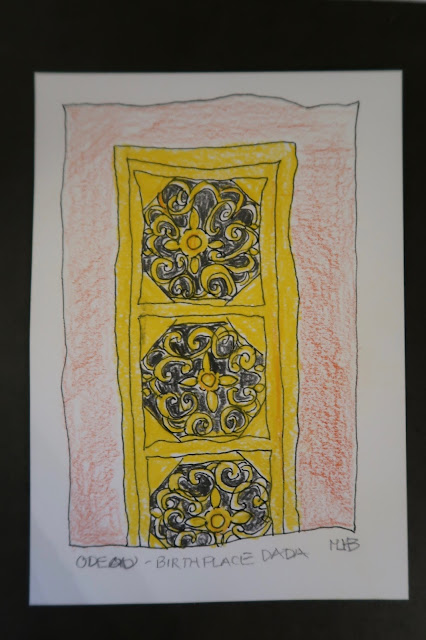 |
| Morning Coffee at Cafe Odeon, one of homes to Dada Art Movement. |
In Switzerland, the Museums are closed on Mondays. So whilst my spousal unit lectured at the University, I re-enacted Art History. Zurich has a half dozen cafés and taverns that are associated with the short-lived but influential artists movement called Dada in 1916.
In case you don't remember Dada, Wikipedia will tell you that its practitioners included Hugo Ball, Marcel Duchamp, Emmy Hennings, Hans Arp, Raoul Hausmann, Hannah Höch, Johannes Baader, Tristan Tzara, Francis Picabia, Huelsenbeck, George Grosz, John Heartfield, Man Ray, Beatrice Wood, Kurt Schwitters, Hans Richter, and Max Ernst. And that the movement influenced later styles like the avant-garde and downtown music movements, and groups including surrealism, nouveau réalisme, pop art and Fluxus. Dadaist artists expressed their discontent with violence, war, and nationalism, and maintained political affinities with the radical left.
The Dada artists used cafés, taverns and their soirees to share ideas and performances. Feeling I could use some of that inspiration, I drank, ate, wrote and painted in two of the cafés for 5 hours. I've discovered as I become more and more serious about writing, that the thing that keeps me from writing is loneliness. In Switzerland's cafés I can be surrounded by strangers and still concentrate on writing or drawing.
The food reflects the changes of the 100 years since World War I. At Odeon I happily ate an omelette filled with cheese and bacon. Happy because French influenced Lausanne limits breakfast to croissant and other breads, and I'm a protein breakfast kind of gal. At the Terasse, now hopelessly bourgeois with ladies lunching and tea-ing, I indulged in a hamburger of flavorful Swiss beef.
 |
Bronze Heating Ducts at Odeon.
|
I am hopelessly bourgeoise, and 100 years younger than Dada. I have difficulty appreciating how a anti-materialist Art Movement could begin in such comfortable surroundings!













